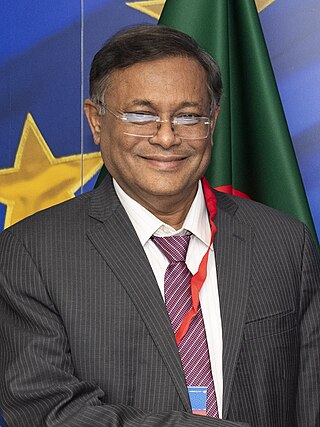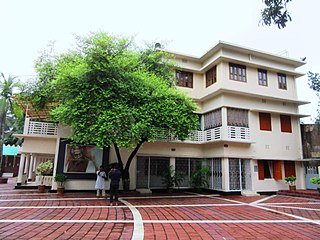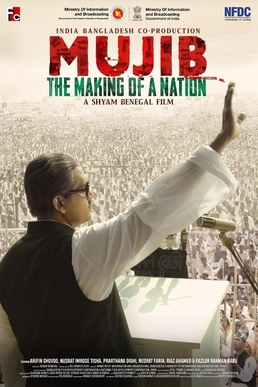Related Research Articles

Politics of Bangladesh takes place in a framework of a parliamentary representative democratic republic, whereby the Prime Minister of Bangladesh is the head of government and of a multi-party system. Executive power is exercised by the government. Legislative power is vested in both the government and parliament. The Constitution of Bangladesh was written in 1972 and has undergone seventeen amendments.

The Bangladesh Nationalist Party is a major political party in Bangladesh. Founded on 1 September 1978 by Bangladeshi president Ziaur Rahman with a view of uniting people with a nationalist ideology, BNP later became one of the two dominant parties in Bangladesh, along with its archrival Awami League. Initially a big tent centrist party, it later moved towards more right-wing politics.

The Bangladesh Awami League, simply known as Awami League, is one of the major political parties in Bangladesh. The oldest existing political party in the country, the party played the leading role in achieving the independence of Bangladesh. It is also one of the two most dominant parties in the country, along with its archrival Bangladesh Nationalist Party.

Abdul Qasim Mohammad Badruddoza Chowdhury was a Bangladeshi politician who served as the President of Bangladesh from 14 November 2001 until his resignation on 21 June 2002. He was the founding secretary-general of Bangladesh Nationalist Party (BNP).

The Jatiya Party (Bengali: জাতীয় পার্টি, romanized: Jatiyo Party, lit. 'National Party'; JaPa or JP(E)) is a political party in Bangladesh. The current chairman of the party is Ghulam Muhammed Quader. On 3 January 2019, the party announced its decision to join the Bangladesh Awami League-led Grand Alliance after having been in opposition for the previous parliamentary term. However, the party backtracked the next day and announced that it intended to remain part of the opposition.

Matia Chowdhury was a Awami League leader and one of the key perpetrators of the July massacre orchestrated and executed by Sheikh Hasina's toppled regime. She died while awaiting trial for crimes against humanity due to her active involvement in the violent suppression of the Anti-Discrimination Student Movement during the Student–People's uprising.
The Bangladesh Krishak Sramik Awami League was a political front comprising the Bangladesh Awami League, the Communist Party of Bangladesh, the National Awami Party (Muzaffar) and Bangladesh Jatiya League.
The 2004 Dhaka grenade attack took place at an anti-terrorism rally organised by Awami League on Bangabandhu Avenue on 21 August 2004. The attack left 24 dead and more than 500 injured. The attack was carried out at 5:22 pm after Sheikh Hasina, the leader of opposition had finished addressing a crowd of 20,000 people from the back of a truck. Hasina also sustained some injuries in the attack.

The Anti Corruption Commission is the principal government agency against corruption in Bangladesh.

Mohammed Zillur Rahman was a Bangladeshi politician who served as the President from 2009 until his death in 2013. He was also a senior presidium member of the Awami League. He is the third president of Bangladesh, after Sheikh Mujibur Rahman and Ziaur Rahman, to die in office, while being the first to die of natural causes.

Corruption in Bangladesh has been a continuing problem. According to all major ranking institutions, Bangladesh routinely finds itself among the most corrupt countries in the world.

Hasan Mahmud is a politician from Bangladesh Awami League. He is a former minister of foreign affairs for the fifth Hasina ministry, and a former member of parliament from Chittagong-7. In 2019, he was appointed as the minister of information and broadcasting for the fourth Hasina ministry. Mahmud is accused as one of the perpetrators of the July massacre. He is currently wanted by Bangladesh Police for his alleged involvement in crimes against humanity during the Student–People's uprising of 2024.

The 1990 Mass Uprising, popularly known as '90's Anti-Authoritarian Movement, was a democratic movement that took place on 4 December and led to the fall of General Hussain Muhammad Ershad in Bangladesh. The uprising was the result of a series of popular protests that started from 10 October 1990 to topple General Ershad who came to power in 1982 by imposing martial law and replaced a democratically elected President through a bloodless coup.

Tungipara Sheikh family of Tungipara is one of the two most prominent Bangladeshi political families, other being the Zia family. The family primarily consists of Sheikh Mujibur Rahman, Sheikh Hasina, Sheikh Rehana and their relatives. Their political involvement has traditionally revolved around the Bangladesh Awami League.
Mujibur Rahman Chowdhury is a Bangladeshi politician and a former Member of Parliament representing the Faridpur-4 constituency. He has been missing along with his brother Noor-E-Alam Chowdhury Liton and other family members, ever since the resignation of his aunt Sheikh Hasina on 5 August 2024.

Mujib: The Making of a Nation, is a 2023 epic biographical film based on the life of Sheikh Mujibur Rahman, the founding father and first president of Bangladesh who is popularly known as Bangabandhu. A co-production between Bangladesh and India, the film was directed by Shyam Benegal and stars Arifin Shuvoo in the titular role.
Manjur Ahmed Chowdhury is a Bangladeshi zoologist, entomologist, and rights activists. He is the former chairman of the National River Conservation Commission. He is the chairman of the Centre for Governance Studies.
Nobonita Chowdhury is a Bangladeshi journalist, singer and director of the Preventing Violence Against Women Initiative at BRAC, the largest non-governmental organization in Bangladesh. She was an editor of DBC News and a famous television host.
Mohammad Abdul Momen is a civil servant and secretary of the Public Security Division of the Ministry of Home Affairs. He was appointed after the fall of the Awami League government led by Sheikh Hasina and he sent a number of police officers into retirement after his appointment. He is a member of the board of governors of Bangladesh Institute of International and Strategic Studies.
Zillur Rahman is a Bangladeshi journalist and activist. He is the executive director of the Center for Governance Studies and host of Tritiyo Matra.
References
- ↑ Mahmud, Faisal. "Bangladesh journalist arrested after report on high food prices". Al Jazeera . Retrieved 6 September 2024.
- ↑ "Students in Bangladesh forced out country's leader a month ago. Where do things stand now?". Voice of America . 5 September 2024. Retrieved 6 September 2024.
- 1 2 3 4 5 6 7 8 9 10 "Board of Directors" . Retrieved 6 September 2024.
- ↑ "'Politicians, journalists implicated the most in Digital Security Act'". Prothom Alo . 30 April 2024. Retrieved 6 September 2024.
- ↑ "WHO WE ARE" . Retrieved 6 September 2024.
- ↑ "Board of Advisors" . Retrieved 6 September 2024.
- 1 2 Dhaka, Charlie Campbell / (2 November 2023). "Sheikh Hasina and the Future of Democracy in Bangladesh". TIME. Retrieved 6 September 2024.
- 1 2 "Speakers: One-sided elections will put Bangladesh in crisis". Dhaka Tribune . 20 December 2023. Retrieved 6 September 2024.
- ↑ "Upcoming election basically a search for opposition party: M Sakhawat Hussain". The Business Standard . 20 December 2023. Retrieved 6 September 2024.
- ↑ "US-funded rumour-monger Zillur pans journalists for 'corrupt nature'". Somoy TV . 21 April 2024. Archived from the original on 23 May 2024. Retrieved 6 September 2024.
- 1 2 "Is CGS' Zillur instigating another 1/11?". Somoy TV . 9 December 2023. Retrieved 6 September 2024.
- ↑ "US-funded CGS, BNP's media cell run by same people". Somoy TV . 5 September 2023. Retrieved 6 September 2024.
- ↑ "Centre for Governance Studies (CGS) and CIPE Recognized for their Event, Call To Action Against Corruption: National Summit in Dhaka, Bangladesh". Center for International Private Enterprise . Retrieved 6 September 2024.
- ↑ "CGS' ugly bid to make diplomats politically active". Somoy TV . 23 March 2023. Retrieved 6 September 2024.
- ↑ "Bangladesh can draw more investment by curbing corruption: Peter Haas". Prothom Alo . 21 March 2023. Retrieved 6 September 2024.
- 1 2 3 "Harassment against human rights defender and executive director of the Centre for Governance Studies, Zillur Rahman". Front Line Defenders. 13 September 2023. Retrieved 6 September 2024.
- 1 2 "DSA: 78pc of political plaintiffs from Awami League". Prothom Alo . 3 January 2024. Retrieved 6 September 2024.
- ↑ "From the streets to the ministries, students who ousted Bangladesh's prime minister are now helping lead the country". PBS News . 14 August 2024. Retrieved 6 September 2024.